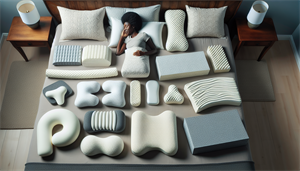Ever wondered why Uncle Joe snores so loudly at family gatherings? Or maybe you’ve been nudged awake by a disgruntled partner, complaining about your nighttime symphony? Snoring is a common problem that affects many people worldwide. But what causes it, and more importantly, what sleeping position is best for snoring and how can we stop it?
Key Takeaways
-
Side sleeping is the most effective position for reducing snoring as it helps keep the airways open and prevents muscle relaxation in the upper throat.
-
Back sleeping is discouraged for snorers since gravity can pull the tissues surrounding the airway downward, exacerbating snoring, while stomach sleeping can alleviate snoring but may cause neck and back pain.
-
In addition to changing sleep positions, lifestyle modifications like maintaining a healthy weight and avoiding alcohol before bed, along with using appropriate pillows and sleep aids such as bed wedges and adjustable beds, can further reduce snoring.
Understanding Snoring and Its Causes
Loud snoring is the harsh, noisy sound produced during sleep due to a narrowed airway that causes vibrations in the mouth and throat. This narrowing can happen due to several factors, including the relaxation of throat tissues after drinking alcohol, or due to nasal congestion.
Alcohol, a muscle relaxant, can cause the muscular tissue around the lining of the throat to relax, leading to more snoring. This is why after an evening of heavy drinking, you might find yourself snoring more than usual. Nasal congestion, on the other hand, can force you to breathe through your mouth, which causes the jaw and tongue to reposition and exacerbate snoring. This can also affect the quality of your sleep breath.
With a clear understanding of snoring causes, we can identify optimal sleeping positions to mitigate this issue. It could be as simple as changing your sleep position, or it might require addressing health conditions like obstructive sleep apnea syndrome or implementing lifestyle changes such as avoiding alcohol before bedtime.
The Importance of Sleep Position for Snorers

The effect of sleep position on snoring cannot be overstated. The right sleeping position can significantly impact the severity of your snoring and overall sleep quality, giving you, and those around you, a good night’s sleep.
Now, let’s explore some sleep positions that may help alleviate snoring, promote deep sleep, and ultimately lead to a good night’s sleep without the need for sleep medicine.
Side Sleeping: The Optimal Choice
Side sleeping is the champion when it comes to the best sleep position for reducing snoring. This position helps to keep the airways open, preventing the relaxation of muscles in the upper throat that can cause airway blockage. In fact, scientific research supports that sleeping on the side can effectively reduce snoring, thus making it the optimal sleep position for individuals seeking to alleviate this concern. Moreover, this makes side sleeping the best sleeping position for those who want to reduce snoring.
For maximum benefit, refrain from excessively curling your body or hugging yourself tight. This can restrict the diaphragm and lungs, which may worsen snoring. Instead, stretching out a bit can optimize the side sleeping position and further reduce snoring.
While side sleeping might seem straightforward, maintaining this position all night can be a challenge for some. Some snorers find using a body pillow or tennis balls attached to the back of their pajamas helpful in preventing them from rolling onto their backs while sleeping.
Avoiding Back Sleeping
While back sleeping may seem comfortable, it’s advisable for snorers to avoid it. Why? Well, when you sleep on your back, gravity pulls the tissues surrounding the airway downward, causing the airway to become more narrow and worsening snoring.
To prevent sleeping on your back, you can utilize several techniques:
-
Use a pillow under your knees or lower back
-
Elevate your upper body with pillows or a wedge pillow
-
Spread out your limbs
-
Ensure proper support for your neck to avoid neck pain.
So, if you catch yourself dozing off on your back, bear in mind the potential for increased snoring. Try to shift to your side or use an aid to maintain a more beneficial sleeping position.
Stomach Sleeping: Pros and Cons
Not everyone can adapt to side sleeping, and for these individuals, stomach sleeping might be the preferable alternative. Stomach sleeping can indeed alleviate snoring and may also reduce sleep apnea and improve digestion, thereby potentially enhancing the quality of a good night’s sleep for certain individuals.
However, stomach sleeping is not without its drawbacks. It can result in:
-
Neck and back pain due to inadequate spine alignment
-
Heightened pressure on the spine
-
Discomfort, strain, and potential complications with the discs and joints
-
Poor sleep
These issues can be caused by the position of the head and neck while sleeping on the stomach.
While stomach sleeping can effectively reduce snoring for some, it’s necessary to weigh the potential risks and discomforts it might cause. For those who find stomach sleeping comfortable and see a reduction in their snoring, then it’s a viable option. But for those who experience neck or back pain, it’s better to seek other alternatives.
Additional Tips for Reducing Snoring
Apart from modifying your sleeping position, there are additional lifestyle changes you can make to further reduce snoring. One of the most effective ways is to maintain a healthy weight. Excess fat and additional tissues in the throat can contribute to snoring, so maintaining a healthy weight can help alleviate this issue.
Another tip is to abstain from alcohol before bedtime. As we’ve learned, alcohol can exacerbate snoring and nighttime breathing issues. So, it’s advisable to avoid that nightcap if you want to reduce your snoring.
Implementing these lifestyle changes can significantly help you stop snoring and lower your risk of developing obstructive sleep apnea syndrome. Remember, a good night’s sleep is not just about the quantity, but also the quality of sleep you’re getting.
Positional Therapy and Sleep Aids

Apart from sleep positions and lifestyle changes, positional therapy and sleep aids can also significantly help in managing snoring. Let’s examine some of the most efficient positional therapies and sleep aids aimed at enhancing your sleep quality.
Best Pillows for Snorers
When it comes to reducing snoring, the right pillow can make a world of difference. Pillows can help:
-
Align the head and neck to open the airways
-
Improve breathing
-
Position the head in a neutral position to contribute to an open and clear respiratory path.
There are several pillows recommended for snorers, such as the EPABO Contour Memory Foam Pillow, Sissel Classic Orthopedic Pillow, and Tempur-Pedic NeckPillow - Travel. These pillows offer essential head and neck support, which can aid in opening the airways and preventing neck pain.
For those with allergies, the Avocado Green Pillow, made from hypoallergenic organic latex, can be a great choice. Not only does it help reduce snoring, but it also promotes better sleep breath.
Bed Wedges and Adjustable Beds
Bed wedges and adjustable beds can also significantly contribute to reducing snoring. These aids help maintain an inclined sleeping position, which has been shown to reduce snoring and improve sleep quality.
Bed wedges provide support to the upper body, encourage proper spinal alignment, and assist in opening up the airway to prevent obstruction during sleep. Adjustable beds, on the other hand, can provide enhanced blood circulation, alleviate discomfort, and provide customizable sleeping positions that can decrease snoring and sleep apnea symptoms.
Top-rated adjustable beds for snorers include the Sleep Number FlexFit 3 Smart, Quest 2.0 Adjustable Base, and Tempur-Pedic’s TEMPUR-Ergo Extend Smart Base. These beds are recognized for their effectiveness in reducing snoring and sleep apnea symptoms.
When to Seek Professional Help
Although lifestyle modifications and positional therapy can effectively reduce snoring, knowing when to seek medical assistance is vitally important. If your snoring persists despite trying various sleep positions and aids, or if you exhibit symptoms of obstructive sleep apnea syndrome, it’s advisable to consult a healthcare professional.
Ignoring chronic snoring can lead to various complications, including:
-
Diminished sleep quality
-
Daytime lethargy
-
Persistent exhaustion
-
Reduced blood oxygen levels
-
Sleep disruptions
-
Chronic migraines
-
Elevated susceptibility to more severe conditions such as hypertension, cardiovascular disease, Type 2 diabetes, and depression.
Healthcare professionals can conduct a sleep study or polysomnography, a thorough examination that monitors brain waves and other essential signs during sleep. This can provide insights into sleep disorders, including those associated with snoring, such as sleep apnea, thereby facilitating accurate diagnosis and treatment.
Summary
In conclusion, snoring is not just a mere annoyance; it has potential implications on your health and well-being. Understanding the causes of snoring, such as alcohol and nasal congestion, is the first step in managing it. Choosing the right sleep position, implementing lifestyle modifications, and using sleep aids and positional therapy are also effective ways to reduce snoring.
Remember, achieving a good night’s sleep is not an overnight process. It takes time, effort, and sometimes, professional help. With the right knowledge and tools, you can turn your loud nights into peaceful slumbers, benefiting not just yourself, but also those around you.
Frequently Asked Questions
What position reduces snoring?
Sleeping on your side or stomach can help keep the airways open, reducing snoring and alleviating mild apnea. This position can be effective for reducing snoring.
Is a higher or lower pillow better for snoring?
A lower pillow is better for snoring as it helps to gently elevate the head without straining the neck muscles and spine. Avoid using a pillow that is too high.
How do I stop snoring while sleeping?
To stop snoring while sleeping, try changing your sleep position, maintaining a healthy weight, avoiding alcohol, keeping nasal passages open, and staying well-hydrated. These lifestyle changes can significantly reduce snoring.
Related health topics?
You can find various health topics.
Why does drinking alcohol cause snoring?
Drinking alcohol causes snoring because it is a muscle relaxant, leading to the relaxation of the muscular tissue around the throat lining. This results in increased snoring.


